- europages
- >
- COMPANIES - SUPPLIERS - SERVICE PROVIDERS
- >
- stationary
Results for
Stationary - Import export
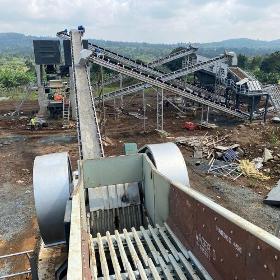
POLYGONMACH MAKINE SANAYI VE TICARET LTD STI
Turkey
These plants long lifespan makes them ideal for large-scale mining quarrying and recycling operations where the volume and consistency of the material being processed necessitate a dependable long-term solution with high productivity. Portable crushing plants can be built with specific operational requirements in mind taking into account factors like the type of material to be processed capacity requirements end-product specifications and spatial constraints unique to the site. The plant will be able to manage the expected throughput and material properties with this level of personalization providing a tailored solution that maximizes the profitability and productivity of the operations. Modern technology features like automation and monitoring systems which provide operators with precise control over the crushing process are integrated into operations to further improve their efficiency safety and scalability.
Request for a quote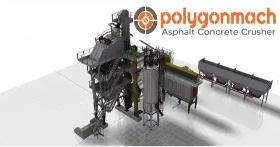
POLYGONMACH MAKINE SANAYI VE TICARET LTD STI
Turkey
Large-scale construction projects require asphalt of the highest caliber which is why the PBA 200-240 TPH Stationary Asphalt Plant has a high capacity. This plant which can produce between 200 and 240 tons per hour guarantees dependable efficient operation which is essential for maintaining the momentum of large-scale projects. This plant is built to withstand the rigorous requirements of construction projects be it highways airports or sizable industrial complexes. By carefully regulating the production process this plant excels in producing asphalt with exceptional quality. The PBA 200-240 TPH Stationary Asphalt Plant produces a product that is dependable and long-lasting by making sure that every batch satisfies stringent industry standards. In order to produce asphalt that can endure the rigors of heavy traffic and variable weather conditions assuring long-lasting performance and safety a high degree of precision and quality control is imperative.
Request for a quote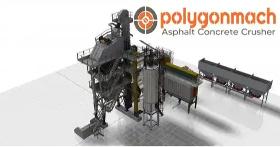
POLYGONMACH MAKINE SANAYI VE TICARET LTD STI
Turkey
Large-scale construction projects require an asphalt production plant with a high capacity and the PBA 100-120 TPH Stationary Asphalt Plant is designed to meet those needs. This facility guarantees dependable high-efficiency operation with a production capacity of 100–120 tons of asphalt per hour. Because of its painstaking attention to detail every batch of asphalt is guaranteed to meet the highest industry standards ensuring the durability and functionality of the built roads and structures. This plant is designed to function extraordinarily well whether it is used on commercial structures or highways. The Polygonmach PBA 100-120 TPH Stationary Asphalt Plant has the power to completely change how asphalt is produced for large-scale building initiatives. This state-of-the-art equipment is an essential part of large-scale construction projects because it is made to maximize and streamline asphalt production.
Request for a quote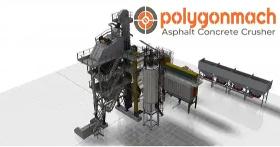
POLYGONMACH MAKINE SANAYI VE TICARET LTD STI
Turkey
Discover the world of efficient asphalt production because of Polygonmachs PBA 120-140 TPH Stationary Asphalt Plant asphalt produced for large-scale construction projects will be produced differently. These cutting-edge instruments can optimize the asphalt production process which makes them an invaluable asset for large-scale construction projects. The PBA 120–140 TPH Stationary Asphalt Plant is covered in great detail in this article along with information on its assembly process and special features. What is the PBA 120-140 TPH Stationary Asphalt Plant like? We guarantee its dependable and effective operation. Because exact control is maintained throughout the entire production process every batch of asphalt produced by this plant is guaranteed to meet the highest industry standards. The PBA 120-140 TPH Stationary Asphalt Plant is perfect for highways and commercial buildings because it ensures the longevity and functionality of the built roads and structures.
Request for a quote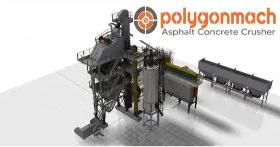
POLYGONMACH MAKINE SANAYI VE TICARET LTD STI
Turkey
The Polygonmach PBA 40-60 Tph Stationary Asphalt Plant is your gateway to productive asphalt production. The PBA 40–60 Tph Stationary Asphalt Plant by Polygonmach is a state-of-the-art option made to maximize the production of asphalt for a variety of building projects. This cutting-edge machinery guarantees reliable and effective performance making it an invaluable resource for any major construction project. This post will explore the PBA 40–60 Tph Stationary Asphalt Plant including its definition workings major parts assembly procedure and unique selling points. What is the 40–60 Tph Stationary Asphalt Plant manufactured by PBA? The PBA 40–60 Tph Stationary Asphalt Plant is a stationary high-capacity facility designed to generate premium asphalt. This plant is made to handle the demands of large-scale construction projects because it can produce 40 to 60 tons of asphalt per hour.
Request for a quote
EMIR BANT
Turkey
Because of its design, it can be carried around in a bag, pencil case, pocket, desk and office. Owing to its functional dispenser, it provides easy tear and comfort to use with all tape types.
Request for a quote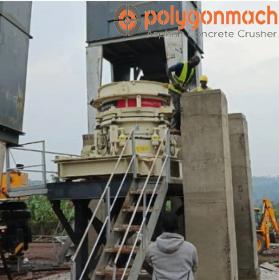
POLYGONMACH MAKINE SANAYI VE TICARET LTD STI
Turkey
A 40-60 TPH Basalt Crushing Screening Plant represents the optimal configuration in regard to crushing and curing basalt stones for a proper production facility. Basalt, the volcanic rock, with phenomenal indicators for stress, is filled with the unknown minerals, having extremely unique properties, hardness, and durability, making it easy to produce. These plants intake large stones of basalts, crush them into smaller fragments using a primary crusher, and then secondary crushers take over to refine the material in order to obtain aggregate fractions of certain sizes. The vibration screens classify the crushed basalts into different size fractions. This systematic approach guarantees that projects in construction, infrastructure, and landscaping that require top-quality basalt aggregates meet the final quality and usability required.
Request for a quote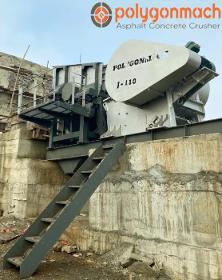
POLYGONMACH MAKINE SANAYI VE TICARET LTD STI
Turkey
The 50-100 tph Riverstone Crushing and Screening Plants shall produce high quality aggregates out of Riverstones at an efficiency in a throughput capacity range of 50 to 100 tons per hour. Prescreening, primary crushing, screening machineries, and conveyors need to be set up for the processing of Riverstones especially for setting up the main infrastructure with suitable size fractions for construction, landscaping, and industrial purposes. The primary crushers at such plants include jaw or impact crushers, which take the raw Riverstones and break them into smaller fragments to kick off the processing. The process of screening separates these aggregates in sizes according to any given project's specifications. The break sizes are specified in applications; the size is directly proportionate to the life of the road. The vigorous screening process guarantees the final aggregates within very tight quality standards for varied applications and makes
Request for a quote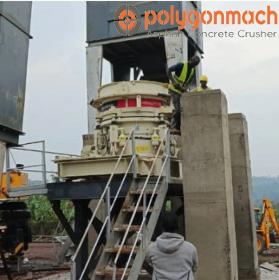
POLYGONMACH MAKINE SANAYI VE TICARET LTD STI
Turkey
The 40-60 TPH Riverstone crushing and screening plants are made for the production of top-quality aggregates from Riverstones effectively at a capacity of 40-60 short tons per hour. The pre-primary crushing machinery, screening equipment, and conveying systems of this plant are specially designed for the processing of Riverstones. These plants break the raw Riverstones into smaller pieces with the help of primary crushers such as jaw crushers or impact crushers. This starts the initial process. The product from primary crushing is later passed through vibrating screens for the purpose of classifying the aggregates into various fractions according to size. This screening procedure is very vital to ensure that the final aggregates produced meet the quality standards for use in various construction, landscaping, and industrial applications. By processing Riverstones systematically, the 40-60 tph Riverstone Crushing and Screening Plants turn them into a better aggregate that will
Request for a quote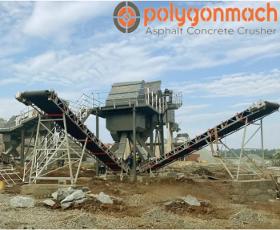
POLYGONMACH MAKINE SANAYI VE TICARET LTD STI
Turkey
The 500-750 tph Granite Crushing and Screening Plants are high-tech installations permitting the processing of granites in large quantities to high-quality aggregates at an impressive production capacity, in the range of 500 to 750 tons per hour. These plants consist of primary crushers, secondary crushers, vibrating screens, conveyors, and feeders, designed under the principle of working hard for the careful optimization of crushing and screening processes. In the advanced plants, the primary crushers are servicing the purpose of breaking big granite rocks into fragments of smaller size; secondary crushers then receive the product from these to further crush it in order to come up with the aggregate of the desired size. Vibrating screens are used for screening the crushed stone material to separate the product into fractions of various size in order to secure that final aggregates are of high quality to be used in various construction projects, infrastructure developments, and industr
Request for a quote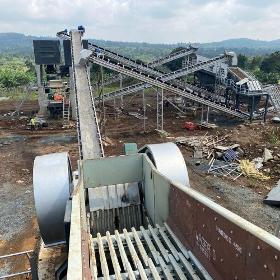
POLYGONMACH MAKINE SANAYI VE TICARET LTD STI
Turkey
The 350-500 tph Granite Crushing and Screening Plant is one of the large full-featured plants unveiled for the market, designed to generate quality granite aggregate, at processing intensity levels from 350 to 500 TPH. These plants come championed with primary crushers, secondary crushers, operating conveyors and feeders, vibrating screens, all gruesomely engineered for optimum crushing and screening effectively. The primary crushers are expected to reduce oversize granite rocks into properly sized fragments for processing to produce more value-added building material. The secondary crushers are for a finer aspect of anything so that they reach the ideal size aggregate, and the vibrating screens perform an accurate classification of the crushed stone into different fractions, by size. Such stringent screening ensures that the end aggregates are produced of remarkable quality for use in various kinds of construction work and infrastructural projects as well as in many industrial applica
Request for a quote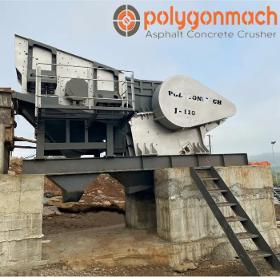
POLYGONMACH MAKINE SANAYI VE TICARET LTD STI
Turkey
The 150-250 tph granite crushing and screening plant was made for the reason of bringing into satisfaction the ability to crush the diverse sizes of granite aggregates that would be required for the purpose and thus have the capacity of about 150-250 tons per hour. It consists basically of primary crushers, secondary crushers, vibrating screens, conveyors, and feeders that are designed for the efficient processing of stones. These large granite stones are first crushed using the primary crusher of the plants and then the secondary crusher, which can make them into desired aggregate sizes. After that, the stone materials from the crushed stone are screened on vibrating screens into fractions according to size. This separates final products with assured quality features essential for construction work and industrial use. These plants crush granite stones of various requirements and further screen them to give an excellent quality aggregate, fitting a myriad of constructions and purposes,
Request for a quote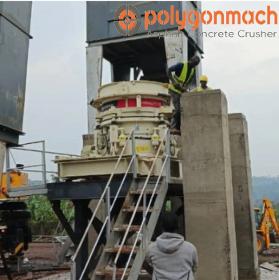
POLYGONMACH MAKINE SANAYI VE TICARET LTD STI
Turkey
100-150 tph Granite Crushing and Screening Plants are specialized facilities designed to process granite stone into various sizes of aggregates at a throughput capacity ranging from 100 to 150 tons per hour. These plants consist of primary crushers, secondary crushers, vibrating screens, conveyors, and feeders specifically engineered for efficient granite processing. The primary crushers within these plants break down large granite stones into smaller fragments, which are further refined by secondary crushers to achieve the desired aggregate sizes. Subsequently, the crushed granite material undergoes screening using vibrating screens to separate it into different fractions based on size. By systematically crushing and screening granite stones, these plants produce high-quality aggregates suitable for a broad range of applications in construction, infrastructure development, road construction, and landscaping projects.
Request for a quote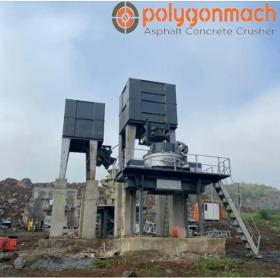
POLYGONMACH MAKINE SANAYI VE TICARET LTD STI
Turkey
The 50-100 TPH granite crushing and screening plant is a course applied in the production line that crushes granite stones to produce the required size of aggregate in the range of 50 to 100 tonnes per hour. The design is for processing granite condensations of hard nature made from hard raw materials. The plant normally has primary and secondary crushers, vibrating screens, conveyors and feeders. The primary crushers reduce the granitic large stones to significant parts and the secondary crushers crush these lowers into particle sizes. After the crushing process, the material is required to be sifted using the vibrating screens to classify it into different sizes. It must comply with some stringent criteria to be applied in numerous construction and industrial operations. Since the plants have been set up for producing high quality, they can be used in a variety of construction needs—be it for building, building infrastructures, constructing roads, or even working on landscape projec
Request for a quote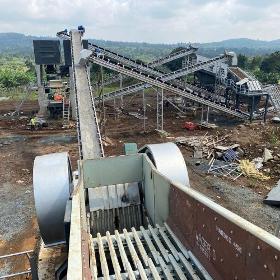
POLYGONMACH MAKINE SANAYI VE TICARET LTD STI
Turkey
The 40-60 tph granite crushing and screening plant is an intermediate-sized facility, compact yet potent, designed to deal with small to medium-sized operations where granite is crushed and screened into such products. These plants can be configured either as mobile or fixed installations based on project demand. Plants primarily produce high-quality aggregates from granite stones, which are major material used in constructions, infrastructure development, and other industrial applications. These are best suited for works whose requirements fall within the moderate output of crushed granite at a time between 40 to 60 tons per hour, assuring effectiveness and reliable service.
Request for a quote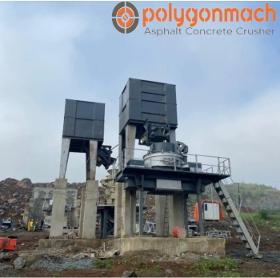
POLYGONMACH MAKINE SANAYI VE TICARET LTD STI
Turkey
A 700-1000 TPH Gabbro Crushing Screening Plant is an industrialized facility created for handling huge amounts of gabbro rock and processing it into various aggregate sizes needed for various construction and industrial purposes. Such plants, with their capability for processing between 700 and 1,000 tons of gabbro per hour, are crucial in running large-scale operations where efficiency and high output are important. They have heavy machinery that will crush the rough, coarse-grained gabbro rock into medium manageable and then sort it out according to sizes. That will make them perfect for use in those projects that demand large volumes of highest-quality aggregate, which includes highway construction, airport runways, and large infrastructure projects. The plants are not all about brawn; they are technological masterpieces put into place to ensure there is accuracy in the crushing and screening departments.
Request for a quote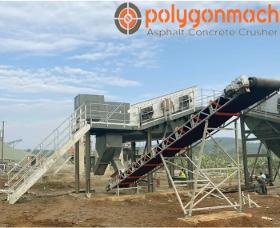
POLYGONMACH MAKINE SANAYI VE TICARET LTD STI
Turkey
The 150-250 TPH Gabbro Crushing Screening Plant is designed to process the gabbro stone material efficiently at an average capacity of 150-250 tons per hour. The plants are equipped with advanced crushing and screening technology, ensuring an effective volume of Gabbro rocks and producing high-quality aggregates to address construction needs. The process begins with primary crushers, such as jaw crushers, which break the big gabbro rocks into small lumps. These primary lumps are further broken into desired aggregate sizes by secondary and tertiary crushers. The vibrating screens sort aggregate material produced from the various stages of crushers into several fractions in regard to size from the crushed gabbro. This ensures that the final product is homogenous and falls within the specifications required in various construction applications.
Request for a quoteDo you sell or make similar products?
Sign up to europages and have your products listed
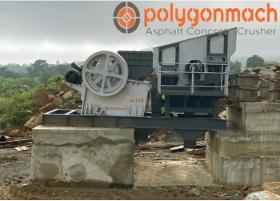
POLYGONMACH MAKINE SANAYI VE TICARET LTD STI
Turkey
The 50-100 tph gabbro crushing and screening plant is designed to handle the toughest and densest of all igneous rocks, Gabbro, producing various aggregate sizes. This is of capacity 50 to 100 tons per hour, so it would service medium to large-scale production. This plant primarily functions as a facility for crushing large stones of gabbro into smaller ones and then sorting them out according to the size requirements. Crushing normally starts with a jaw crusher, which does a primary size reduction. Following this are the secondary and tertiary crushers, which give the product different aggregate sizes. The crushed gabbro is then screened into fractions by screening equipment to ensure that the final product meets the requirements that are required in construction and other industries. This plant has the capacity to process 50-100 TPH, making it versatile and efficient in producing high-quality gabbro aggregates.
Request for a quote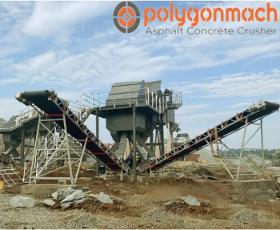
POLYGONMACH MAKINE SANAYI VE TICARET LTD STI
Turkey
The 40-60 TPH Gabbro Crushing Screening Plant is a facility specially made to process gabbro stone material with production capacity between 40 to 60 tonnes per hour. This type of plant design allows crushing and screening operations to be carried out effectively, generating top-quality gabbro aggregates within such a specific throughput range. Primarily, the plant begins with primary crushers—like jaw crushers—that break raw gabbro down into smaller size fractions. Secondary and tertiary crushers further reduce the size of the material as required down the line. The crushed material is then screened through a vibrating screen into different classified size fractions of gabbro for the end product of aggregates to be within the specified criteria. This will make such 40-60 TPH capacity gabbro crushing screening plant an ideal solution to many major problems experienced in the construction and mining industries.
Request for a quote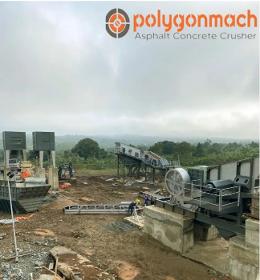
POLYGONMACH MAKINE SANAYI VE TICARET LTD STI
Turkey
The gabbro crushing and screening plant shall be designed capable of processing gabbro, a kind of coarse-grained, dark-colored, and dense igneous rock. Gabbro majorly consists of calcium-rich plagioclase feldspathoid and pyroxene; at times, it also contains olivine, hence very strong. This toughness makes gabbro an excellent source of construction aggregates and road base, but it requires a very robust processing facility to crush and screen efficiently into usable products. Plants for crushing and screening of gabbro are equipped with various heavy-duty machinery, including crushers, screens, and conveyors, all working together to break down large hunks of gabbro into aggregate of varied sizes. The end products are used in different construction projects whereby strength, durability, and quality are paramount concerns.
Request for a quote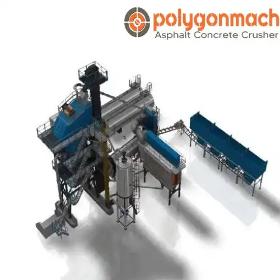
POLYGONMACH MAKINE SANAYI VE TICARET LTD STI
Turkey
Asphalt Manufacturing Facility The stationary hot mix asphalt plants from Polygonmach are not transportable instead they are fixed in one place and intended for large-scale asphalt production. With capacities ranging from 60 to 400 tonnes per hour these plants can produce asphalt continuously which makes them perfect for large-scale projects. Their main job is to combine aggregates like crushed stone sand or gravel with a binder called asphalt cement to create high-quality hot mix asphalt which is an essential material for road construction and maintenance. Asphalt Plant Near me A vital part of any asphalt plant is aggregate storage. The plant stores aggregates in sizable bins or stockpiles which include sand gravel and crushed stone. These components which make up the majority of the asphalt mix are first sorted according to size and quality before being added to the mixing process.
Request for a quote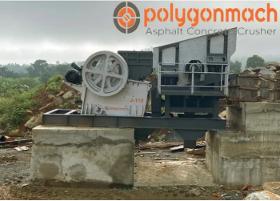
POLYGONMACH MAKINE SANAYI VE TICARET LTD STI
Turkey
Mobile and stationary jaw crushers are types of crushing equipment commonly used in mining, construction, and recycling industries to reduce the size of large rocks, ores, and other materials for further processing. Mobile jaw crushers are designed to be easily transportable and flexible, allowing them to be moved from one site to another. They are equipped with wheels or tracks for mobility, making them ideal for working in different locations. Mobile jaw crushers offer the advantage of on-site crushing, enabling materials to be crushed directly at the job site, reducing transportation costs and saving time. On the other hand, stationary jaw crushers are fixed in one location and are typically larger and more powerful than mobile crushers. They are designed for heavy-duty applications and continuous operation, making them suitable for high-capacity production in stationary plants.
Request for a quote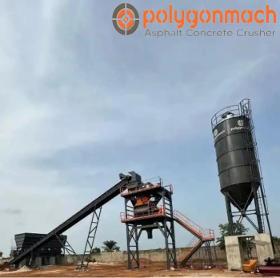
POLYGONMACH MAKINE SANAYI VE TICARET LTD STI
Turkey
A stationary batching plant is a large setup of an equipment meant for the purpose of producing concrete at even close intervals of time. It is fixed at one place and installed for a larger period of time. This stationary batching plant has capacity output for a high amount of concrete, making it suitable for massive infrastructure works and/or skyscrapers and big business structures. Conceived and built to last and consistent in operations such that it can work around the clock if need be. Where aggregates bins, conveyors, cement silos, a mixing unit, and a control system are important components of the plant, other equally essential elements represent the plant's technology level, which enables it to perform quality and accurate batching. The stationary plant does not provide easy mobility, as is the case with the mobile one.
Request for a quote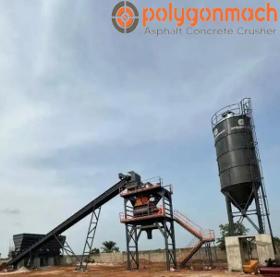
POLYGONMACH MAKINE SANAYI VE TICARET LTD STI
Turkey
A stationary batching plant is a large setup of an equipment meant for the purpose of producing concrete at even close intervals of time. It is fixed at one place and installed for a larger period of time. This stationary batching plant has capacity output for a high amount of concrete, making it suitable for massive infrastructure works and/or skyscrapers and big business structures. Conceived and built to last and consistent in operations such that it can work around the clock if need be. Where aggregates bins, conveyors, cement silos, a mixing unit, and a control system are important components of the plant, other equally essential elements represent the plant's technology level, which enables it to perform quality and accurate batching. The stationary plant does not provide easy mobility, as is the case with the mobile one.
Request for a quote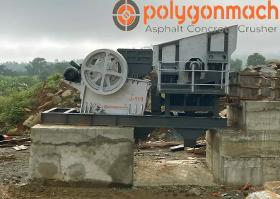
POLYGONMACH MAKINE SANAYI VE TICARET LTD STI
Turkey
Mobile and stationary jaw crushers are types of crushing equipment commonly used in mining, construction, and recycling industries to reduce the size of large rocks, ores, and other materials for further processing. Mobile jaw crushers are designed to be easily transportable and flexible, allowing them to be moved from one site to another. They are equipped with wheels or tracks for mobility, making them ideal for working in different locations. Mobile jaw crushers offer the advantage of on-site crushing, enabling materials to be crushed directly at the job site, reducing transportation costs and saving time. On the other hand, stationary jaw crushers are fixed in one location and are typically larger and more powerful than mobile crushers. They are designed for heavy-duty applications and continuous operation, making them suitable for high-capacity production in stationary plants.
Request for a quote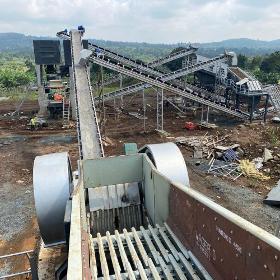
POLYGONMACH MAKINE SANAYI VE TICARET LTD STI
Turkey
How do you operate a crushing and screening plant? In mining operations or quarry sites a stationary crushing plant is a permanent installation used for crushing and sizing large quantities of raw materials into smaller more manageable pieces. An efficient and highly effective crushing and screening process is created by strategically arranging a variety of crushers screens conveyors and feeding devices in stationary crushing plants which are fixed in one location. Static crushing plants are fixed in one location as opposed to mobile crushing plants which can be moved and set up in different locations to meet temporary processing needs. These plants long lifespan makes them ideal for large-scale mining quarrying and recycling operations where the volume and consistency of the material being processed necessitate a dependable long-term solution with high productivity.
Request for a quote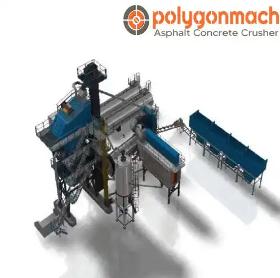
POLYGONMACH MAKINE SANAYI VE TICARET LTD STI
Turkey
Asphalt Manufacturing Facility The stationary hot mix asphalt plants from Polygonmach are not transportable instead they are fixed in one place and intended for large-scale asphalt production. With capacities ranging from 60 to 400 tonnes per hour these plants can produce asphalt continuously which makes them perfect for large-scale projects. Their main job is to combine aggregates like crushed stone sand or gravel with a binder called asphalt cement to create high-quality hot mix asphalt which is an essential material for road construction and maintenance. Asphalt Plant Near me A vital part of any asphalt plant is aggregate storage. The plant stores aggregates in sizable bins or stockpiles which include sand gravel and crushed stone. These components which make up the majority of the asphalt mix are first sorted according to size and quality before being added to the mixing process.
Request for a quote
ROVIMEX BATTERY AND ENERGY TECHNOLOGIES
Turkey
75W Power Total maximum power: 140W Nominal air power: 75W Temperature selection range: 90-450C Antistatic control box Weight 2.4kg There is no soldering iron tip included in the package. Battery Cycle Count A typical cell phone battery goes through approximately 500 cycles before retaining at least 80% of its original capacity. Made from new materials, our batteries have zero cycles, ensuring the maximum number of cycles you can use. Zero Cycle Count, so you have the maximum amount of cycles remaining. Lithium-Ion Polymer technological materials Strict QC test Less than 1% failure rate 12 Yes Garanti
Request for a quote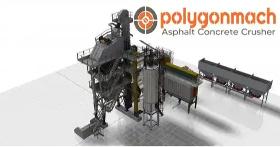
POLYGONMACH MAKINE SANAYI VE TICARET LTD STI
Turkey
The pinnacle of productivity and innovation in asphalt manufacturing can be found in Polygonmachs PBA 320–400 TPH Stationary Asphalt Plant. Large-scale construction projects are the target market for this cutting-edge machinery which streamlines operations and maximizes the entire production process to deliver superior results. This page examines PBA 320-400 TPH Stationary Asphalt Plants key features assembly process specifications and unique selling points. One type of high-capacity equipment used to create high-quality asphalt for large construction projects is the PBA 320–400 TPH Stationary Asphalt Plant. The robust requirements of major infrastructure projects like highways airports and industrial sites are what this plant is designed to withstand. It can generate between 320 and 400 tons of asphalt per hour. Even the most ambitious projects will be successfully and on schedule thanks to the projects high production capacity.
Request for a quoteResults for
Stationary - Import exportNumber of results
75 ProductsCompany type
Category
- Concrete preparing - machinery and equipment (24)
- Crushing and grinding machinery (17)
- Tar and asphalt - construction materials (11)
- Construction - Machines & Equipment (9)
- Concrete constructions (8)
- Concrete blocks (4)
- Construction machinery (2)
- Concrete mixers (1)
- Batteries (1)
- Cement-making - machinery and equipment (1)
- Tapes, adhesive (1)